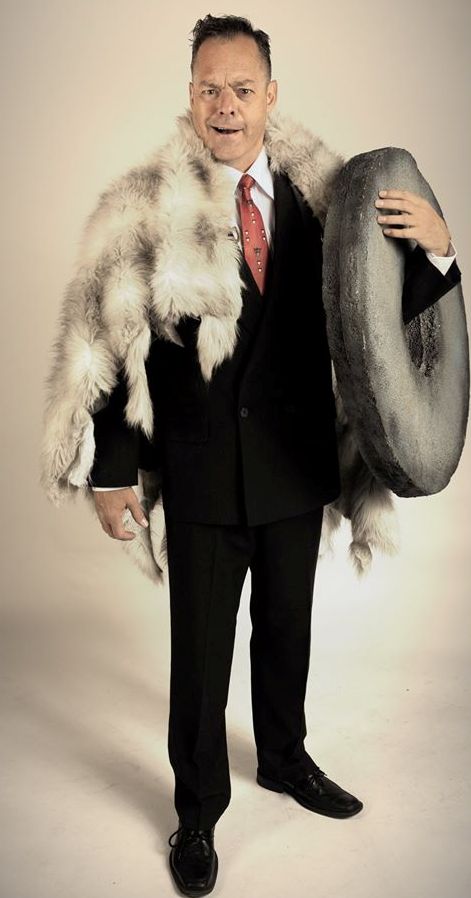A PLAY FOR OUR TIMES: Wild Wilder Wonderfully Done by Bright Young Things
Posted on November 24, 2019 By Colin MacLean Entertainment, Front Slider, Theatre
 The Skin of Our Teeth, Thornton Wilder’s head-scratcher of a three-part allegory about the precarious life of mankind, debuted in 1942. The biting satire won a number of best play awards – including the Pulitzer Prize – and immediately became a hit in the early years of World War II.
The Skin of Our Teeth, Thornton Wilder’s head-scratcher of a three-part allegory about the precarious life of mankind, debuted in 1942. The biting satire won a number of best play awards – including the Pulitzer Prize – and immediately became a hit in the early years of World War II.
Watching it return in 2019 in this superlative Bright Young Things production reminds us that Wilder was not only a brilliant playwright but something of a prophet. It runs in the Varscona Theatre through Nov. 30.
Over the epic nearly three hours of the play (with two intermissions), the Antrobus (Greek for “Human”) family faces environmental calamity, a refugee crisis, political and social division, mass violence, smear politics, a presidential sex scandal and more. In short – a play for our time. If this is the stuff of today’s nightmares, remember it was written nearly 80 years ago.
The playwright also played fast and loose with the theatrical conventions of its day. Characters ignore the fourth wall and address the audience. Sometimes the stage manger stops the performance to give directions to those on stage.
What better company than Bright Young Things to undertake a bold production of a play that usually demands a cast of 32? They are but a hard-working local company of eight.

Jeff Haslam, who invented The Wheel, is President in ‘The Skin of Our Teeth.’
The Antrobus family lives in New Jersey. The first person we meet is the sassy housemaid Sabina (Andrea House) who worries about Mr. Antrobus getting home before the advancing ice sheets arrive. (Note to Edmonton theatres – all plays should start with a monologue by Andrea House.) It is the Ice Age and that is the first of the disasters to befall the family. George (Jeff Haslam) has just invented the wheel and is on his way to completing the alphabet. Mrs. Antrobus (Stephanie Wolfe) keeps the house humming and looks after the kids: Gladys (Lauren Hughes), their “perfect” daughter; and their preternaturally angry son Henry (Vincent Forcier). Biblical invocations abound. The family can be read as Adam, Eve, and offspring.
Outside in the garden lurk a mammoth and a dinosaur.
In Act II, the family is now living the good life in Atlantic City. Civilization has done quite well after the Ice Age. Mr. Antrobus is President. The lovely Lily (House, in another role) is “Miss Atlantic City” and attempts to seduce George. The sky is darkening and the ocean is rising over the beach. A mighty flood is imminent, and George fills a boat at the end of the pier with two of every animal. How will they all survive?
In a more serious Act III, we see them in a destroyed world after a “7 years war.” Sabina pops in to announce the war is over – yet George’s buoyant optimism has faded. During the war, he felt peace would bring a better life – only to find himself in a battle with his stubborn son.
Wilder seem to be telling us in his comedy-drama that human nature is resilient enough to withstand all the vicissitudes fate can throw at it. The playwright eloquently comments on the human condition through one family’s stubborn ability to adapt to the most terrible of circumstances. Wilder playfully throws content, brilliant dialogue, unexpected plot twists and helpings of laugh-out-loud comedy at us.
Expect cameos from Homer, Plato, Aristotle and Spinoza, among others.
There is so much going on here that one can be thankful for director David Horak, whose lucid and inventive approach makes sense of a work that demands a lot from the audience. He starts off Looney Tunes and slowly turns his massive ship around to embrace a very serious message. At one point Sabina looks directly at the audience and complains that she doesn’t understand a word of what’s going on.
“I’d advise you not to think about it” she warns.
Horak plants his tongue firmly in his cheek to present a family gone berserk. He takes the playwright’s relentless approach, dense language and often opaque ideas, and fires them at the audience at such a breathless pace that you don’t have time to over-think them.
“Please don’t take this play too serious,” Sabina advises.
The sets, designed by Horak and Belinda Cornish, are fairly simple but, my, how supple and supportive they are as the Antrobus’ move through the ages.
As Sabina, House is cheeky, outspoken and opinionated. A maid she may be – but she is also her own woman. George is a bit pompous but in Haslam’s delightfully over-the-top performance a likeable everyman. Wolfe’s Mrs. Antrobus might be thought of as a nag, and she is the one with the inner strength to keep the family going. Nicole St. Martin is a forceful if cynical soothsayer.
Sheldon Elter is your genial master of ceremonies (and several other characters). This challenging work needs actors of top calibre and it certain finds them in this stellar troupe.
The play tells us that humanity has always existed perilously on the brink – but we endure.
“This is an awful place,” wails Sabina , but as one character later observes in this ultimately hopeful play, “That’s what we do – always beginning again! Over and over again! We’ll get by – if only by the skin of our teeth.”













